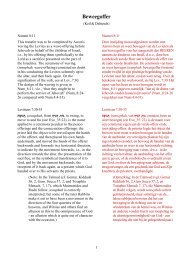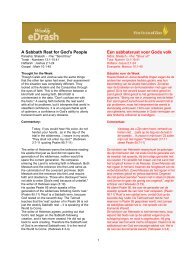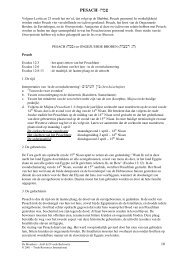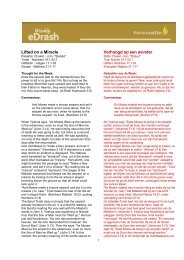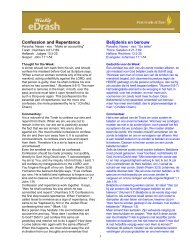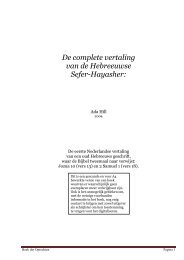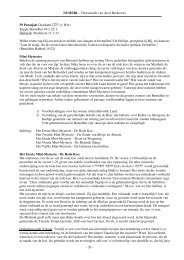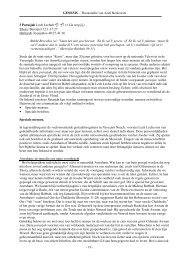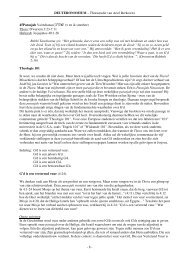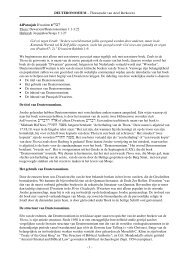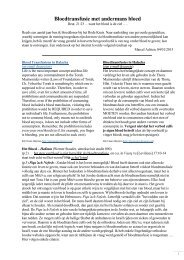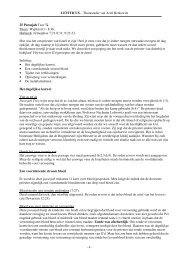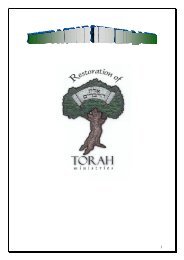Pekudei - Messiaans het levend water
Pekudei - Messiaans het levend water
Pekudei - Messiaans het levend water
You also want an ePaper? Increase the reach of your titles
YUMPU automatically turns print PDFs into web optimized ePapers that Google loves.
The Glory and the Tabernacle<br />
Parasha: <strong>Pekudei</strong> : ידוקפ - "Accounts"<br />
Torah : Exodus 38:21-40:38<br />
Haftarah : I Kings 7:51-8:21<br />
Gospel : John 6:1-71<br />
Thought for the Week<br />
The paradox between the immanence of God and<br />
the transcendence of God paradox is illustrated in<br />
the mechanics of the Tabernacle. The<br />
uncontainable, inapproachable God is somehow<br />
contained (so to speak) within and maybe<br />
approached within a physical Tabernacle on<br />
Earth. The paradox between immanence and<br />
transcendence is also obvious in our sorry<br />
attempts to form a Christology which would<br />
explain the divine nature of Messiah. It is a<br />
mystery no less profound than the mystery of God<br />
taking up residence within the space of the<br />
Tabernacle. It would seem to be an impossibility;<br />
nonetheless, He did.<br />
Commentary<br />
A sudden shout rose up through the assembly and all<br />
eyes were fixed upon the mountain. The cloud which<br />
had covered the top of the mountain these many<br />
days seemed to be descending. Yes, it was, rolling<br />
and cascading down the mountainside like a sudden<br />
avalanche of vapor, mist and smoke.<br />
A panic spread through the people; a holy terror<br />
seized every heart. As if choreographed in advance,<br />
all Israel--every man, woman and child--fell prostrate<br />
to the ground. There was a brilliant light emanating<br />
from the cloud as it dropped from the top of Mount<br />
Sinai. The peak of the mountain was now visible,<br />
gleaming in the sun. Without the cloud covering it, it<br />
seemed to be a small, humble and insignificant<br />
mountain after all. The LORD had left Sinai.<br />
Then the cloud covered the tent of meeting,<br />
and the glory of the LORD filled the<br />
tabernacle. Moses was not able to enter the<br />
tent of meeting because the cloud had settled<br />
on it, and the glory of the LORD filled the<br />
tabernacle. (Exodus 40:34-35)<br />
God had taken up residence in the Tabernacle, but<br />
He was unapproachable. Even Moses, who was<br />
accustomed to standing upon Mount Sinai and<br />
basking in the glory of the presence of the LORD,<br />
could not enter. How is it, then, that Moses was able<br />
to withstand God's glory on Mount Sinai, yet was not<br />
able to enter into the Tabernacle?<br />
1<br />
De heerlijkheid en de Tabernakel<br />
Parasha: <strong>Pekudei</strong>: ידוקפ - "Verantwoording"<br />
Thora: Exodus 38:21-40:38<br />
Haftara: 1 Koningen 7:51-8:21<br />
Evangelie: Johannes 6:1-71<br />
Gedachte voor de Week<br />
De paradox tussen de immanentie (bewuste ervaring van<br />
God) en transcendentie (<strong>het</strong> bovenzinnelijk bewustzijn<br />
van God) wordt geïllustreerd in <strong>het</strong> mechanisme van de<br />
Tabernakel. De niet te beseffen, ongenaakbare God<br />
wordt op een of andere manier (bij wijze van spreken)<br />
binnenin opgenomen en mogelijk binnen een fysieke<br />
Tabernakel op aarde benaderd. De paradox tussen<br />
immanentie en transcendentie is ook duidelijk in onze<br />
bedroevende pogingen om een christologie (christelijke<br />
definitie van Jezus Christus) te vormen, die de goddelijke<br />
natuur van de Messias zou verklaren. Het is een mysterie<br />
,niet minder diepgaand dan <strong>het</strong> mysterie van God die<br />
verblijf houdt in de ruimte van de tabernakel. Het lijkt een<br />
onmogelijkheid; toch deed Hij <strong>het</strong>.<br />
Commentaar<br />
Plots klonk een schreeuw door de vergaderden en<br />
alle ogen waren op de berg gericht. De wolk die de<br />
top van de berg de voorbije dagen had bedekt leek te<br />
dalen. Ja, ze rolde en viel zoals een <strong>water</strong>val naar<br />
beneden langs de berghelling, zoals een plotselinge<br />
lawine van damp, nevel en rook.<br />
Onder <strong>het</strong> volk brak paniek uit, een heilige schrik<br />
greep ieders hart aan. Alsof van tevoren in scene<br />
gezet, knielde toen gans Israel - iedere man, vrouw<br />
en kind - op de grond. Er was een briljant licht dat<br />
van de wolk uitging terwijl ze van de top van de berg<br />
Sinaï viel. De piek van de berg was nu zichtbaar,<br />
blinkend in de zon. Zonder de wolk die hem bedekte,<br />
leek <strong>het</strong> uiteindelijk maar een kleine, bescheiden en<br />
onbeduidende berg. De HEERE had Sinai verlaten.<br />
Toen overdekte de wolk de tent van ontmoeting,<br />
en de heerlijkheid van de HEERE vervulde de<br />
tabernakel, zodat Mozes de tent van ontmoeting<br />
niet kon binnengaan, omdat de wolk daarop<br />
bleef en de heerlijkheid van de HEERE de<br />
tabernakel vervulde. (Exodus 40:34-35, HSV)<br />
God had zijn intrek genomen in de Tabernakel, maar Hij<br />
was ongenaakbaar. Zelfs Mozes, die gewend was op<br />
de berg Sinaï te staan en in de glorie van de<br />
aanwezigheid van de HEER te vertoeven, kon niet naar<br />
binnen. Hoe kan <strong>het</strong> dan, dat Mozes in staat was om<br />
Gods heerlijkheid op de berg Sinaï te weerstaan, maar<br />
niet in staat was om de Tabernakel in te gaan?
When Moses ascended Sinai, he entered into the<br />
true Tabernacle, the very courts of God. Thus the<br />
glory of God on the mountain represents the glory<br />
of God in the World to Come and the New<br />
Covenant, whereas the glory of God in the<br />
Tabernacle is His glory in the this World and<br />
covenant. That is the reason Moses can approach<br />
on the mountain, but was unable to do so when<br />
the glory descends to the earth. The mountain<br />
symbolized the Heavenly reality. Thus even<br />
Yeshua had to veil His glory (except while on the<br />
mountain of transfiguration—a parallel to Sinai).<br />
His glory will only be fully revealed when the<br />
heavenly reality is fully realized on Earth. In that<br />
day, God's people will be able to approach the<br />
Glory without restriction, as John notes, "I saw no<br />
temple in it, for the Lord God the Almighty and the<br />
Lamb are its temple. And the city has no need of<br />
the sun or of the moon to shine on it, for the glory<br />
of God has illumined it, and its lamp is the Lamb."<br />
(Revelation 21:22-23)<br />
2<br />
Toen Mozes de Sinaï besteeg, ging hij in de ware<br />
Tabernakel, de voorhoven van God. Dus de heerlijkheid<br />
van God op de berg vertegenwoordigt de glorie van<br />
God in de toekomstige wereld en <strong>het</strong> Nieuwe Verbond,<br />
terwijl de heerlijkheid van God in de Tabernakel Zijn<br />
heerlijkheid in de deze wereld en <strong>het</strong> verbond is. Dat is<br />
de reden dat Mozes op de berg kon naderen, maar niet<br />
in staat was om dit te doen wanneer de glorie naar de<br />
aarde afdaalde. De berg symboliseerde de hemelse<br />
werkelijkheid. Zelfs Yeshua moest dus Zijn heerlijkheid<br />
afdekken (behalve bij de transfiguratie op de berg - een<br />
verwijzing naar de Sinaï). Zijn heerlijkheid zal alleen<br />
volledig worden onthuld wanneer de hemelse<br />
werkelijkheid volledig gerealiseerd is op aarde. Dan zal<br />
Gods volk in staat zijn tot de Heerlijkheid te naderen<br />
zonder beperking, zoals Johannes opmerkt: "Ik zag<br />
geen tempel in haar, want de Heere, de almachtige<br />
God, is haar tempel, en <strong>het</strong> Lam. En de stad heeft de<br />
zon en de maan niet nodig om haar te beschijnen, want<br />
de heerlijkheid van God verlicht haar, en <strong>het</strong> Lam is<br />
haar lamp."(Openbaring 21:22-23, HSV)



